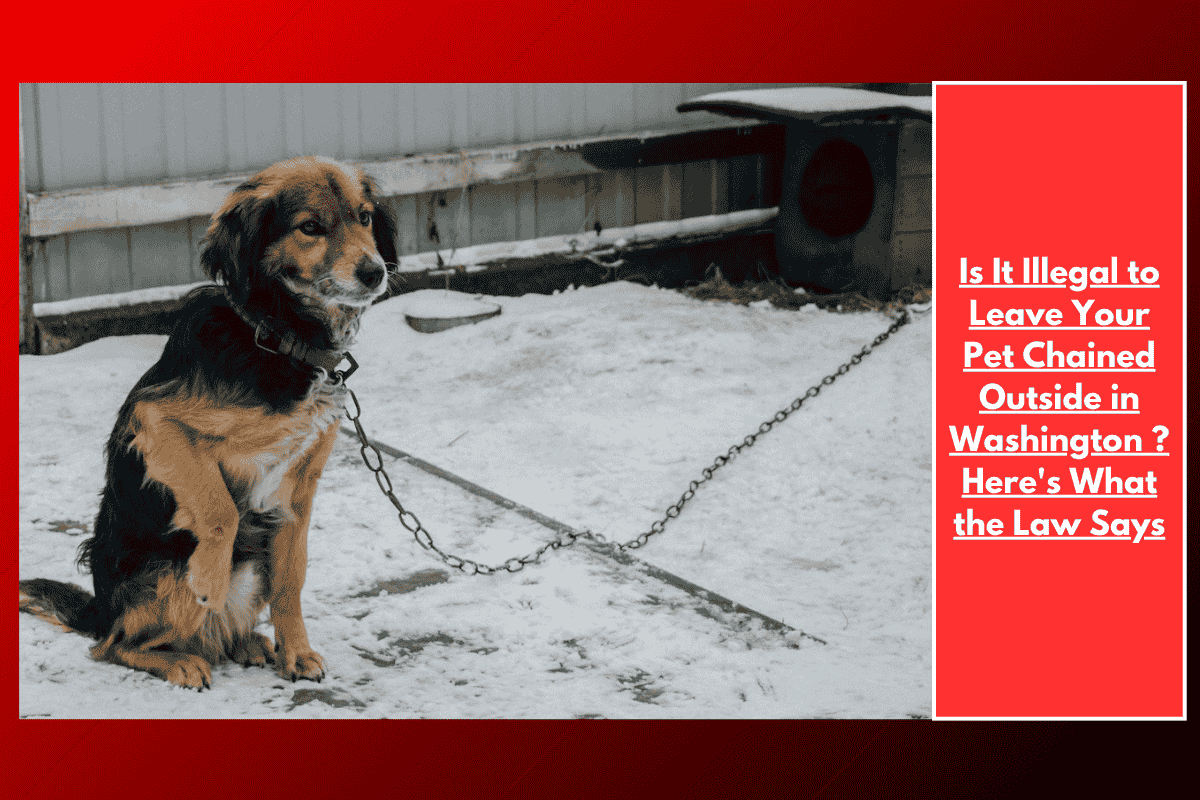As pet ownership continues to rise in Washington state, concerns about the safety and well-being of animals, particularly those left outside, have also grown. One common issue that pet owners face is whether it’s legal to leave their pet chained outside. Many people may not realize that laws surrounding the treatment of animals are in place to protect pets from harm, including chaining them for extended periods. Here’s a breakdown of what the law says about leaving your pet chained outside in Washington.
Washington State’s Animal Cruelty Laws
Washington state has strict animal cruelty laws designed to ensure the safety and proper treatment of pets. Under RCW 16.52, animal cruelty is prohibited, and pets must not be subjected to unnecessary suffering or harm. The law outlines that animals should be provided with adequate food, water, shelter, and space.
Leaving your pet chained outside for extended periods can fall under animal cruelty if it results in harm or discomfort to the animal. Whether it is considered abuse or simply a failure to provide proper care depends on the specific circumstances, including how long the pet is left chained, the weather conditions, and the treatment of the animal.
Washington’s Law on Chaining Pets (RCW 16.52.205)
Washington has a specific law addressing the issue of chaining pets, particularly dogs, outside. RCW 16.52.205 (commonly known as the “anti-chaining law”) was enacted to address the dangers and inhumane treatment associated with keeping a dog tethered for long periods. According to this law:
Tethering or chaining a dog is allowed, but only for short periods and under specific conditions.
It is illegal to chaining a dog outside for an extended period in a way that could cause harm, stress, or injury. The law outlines several conditions to prevent cruel treatment, such as:
The dog must have adequate shelter: The animal must have access to protection from the elements, including proper shelter and shade.
Water and food must always be available for the dog.
The chain or tether must be long enough to allow the dog to move comfortably and access food, water, and shelter.
The “Tethering Dog Law” – Specific Restrictions
In addition to the general animal cruelty laws, Washington also restricts tethering dogs in specific ways:
Tethering a dog in an unsafe manner that causes harm or discomfort is considered illegal.
Dogs cannot be left tethered outside during extreme weather conditions (e.g., extreme heat, freezing temperatures, or heavy rain).
The law also restricts the use of certain tethering devices that may cause harm or injury to the dog.
Tethering for more than 12 hours in a 24-hour period is prohibited unless the dog is being temporarily restrained for a specific purpose.
These regulations aim to ensure that dogs are not left chained for too long in harmful conditions, and that their basic needs for food, water, and shelter are met.
What Happens If You Violate the Law?
If you are found guilty of leaving your pet chained outside in violation of Washington’s animal cruelty and tethering laws, you could face serious consequences. Depending on the severity of the offense, penalties can include:
Fines: You may be fined for violating the tethering laws.
Animal confiscation: In cases of extreme neglect or abuse, authorities can seize the animal to ensure its safety.
Criminal charges: Violation of Washington’s animal cruelty laws can result in criminal charges. A first offense may result in a misdemeanor, while subsequent offenses or cases involving severe harm could lead to felony charges.
What Should You Do to Avoid Violating the Law?
If you plan to leave your pet outside, make sure you are complying with Washington’s laws:
Never leave a dog chained for long periods: If you need to tether your dog, make sure they are outside for only a short time.
Ensure shelter: Your pet must have access to shelter from the weather, including a place to escape extreme heat or cold.
Always provide food and water: Make sure your pet always has access to fresh water and food.
Avoid leaving your dog chained in dangerous conditions: Do not tether your dog during extreme weather conditions, such as heat waves, freezing temperatures, or storms.
Alternatives to Chaining Your Pet Outside
Instead of leaving your pet chained outside, consider these alternatives to keep your pet safe and comfortable:
Fenced-in yard: If you have a yard, consider building a secure fence so your dog can enjoy the outdoors safely without being tethered.
Dog runs: Some pet owners use dog runs or dog pens as an alternative to tethering. These allow pets to roam freely within a confined space without the risk of injury or stress from being chained.
Supervised outdoor time: Rather than leaving your pet outside unsupervised, spend time with them in your yard, offering companionship and monitoring their safety.
Training and socialization: Work on training your pet to stay within a designated outdoor area without the need for chaining. Training your dog to stay safely within a yard or fence can help provide them with freedom while avoiding the need for constant tethering.
In Washington, chaining your pet outside for extended periods is illegal, and it can lead to serious legal consequences if your pet is harmed or neglected. The state’s animal cruelty laws and tethering laws are in place to protect pets from unnecessary suffering, ensuring that they have access to food, water, shelter, and proper care. If you do need to leave your dog outside, make sure to comply with the regulations about shelter, water, food, and weather conditions, and consider alternatives to chaining, such as a secure fence or dog run.
SOURCES
[1] https://www.animallaw.info/topic/table-state-dog-tether-laws
[2] https://app.leg.wa.gov/rcw/default.aspx?cite=16.52.350
[3] https://wacities.org/advocacy/news/advocacy-news/2025/04/14/emergency-preparedness-plans-may-require-accommodating-pets
[4] https://www.animallaw.info/content/map-state-dog-tethering-laws
[5] https://www.steadily.com/blog/pet-laws-regulations-rental-properties-washington














